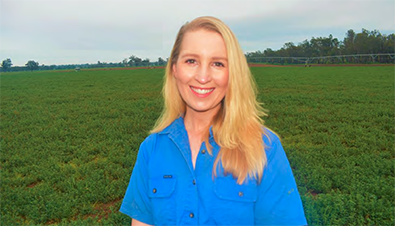Read the latest information on
Foot-and-mouth disease

Claire Petterson, from Collingullie in NSW, will receive a Nuffield Scholarship, sponsored by the Farm Biosecurity Program
Plant Health Australia (PHA) and Animal Health Australia (AHA) are pleased to announce that Claire Petterson, from Collingullie in NSW, will receive a Nuffield Scholarship, sponsored by the Farm Biosecurity Program which is jointly run by the two companies.
Claire manages the family commercial hay and beef cattle farm near Wagga Wagga. Primarily a small square bale lucerne and teff hay enterprise, the family business also runs 60 Hereford and Angus cross breeding cattle across the 300-hectare property.
Every Nuffield Australia Farming Scholarship offers a primary producer a life-changing opportunity to travel and study an agricultural topic of choice.
Hay producers are not without biosecurity risks – from the entry of pests and diseases into their property from contaminated seeds, machinery, fertiliser, livestock and equipment, to unknowingly contributing to the spread of diseases, pests and weeds by selling contaminated product.
Aware of the risks faced by Australian hay growers, Claire is passionate about mitigating production loss risk through best-practice biosecurity measures.
“Through my research, I plan on investigating global biosecurity measures designed to prevent the introduction and spread of harmful organisms including diseases, pests and weed seeds,” Claire said.
“The potential impact of these threats on production and profitability for hay producers is extensive. Sold both domestically and exported, it’s critical that the hay industry is preventing and effectively managing biosecurity risk on-farm to maintain Australia’s product integrity and market access.”
“Biosecurity is more important than ever. Australian hay producers must be at the forefront of biosecurity to both protect and enhance Australia’s reputation as a safe, clean supplier.”
Claire will investigate biosecurity practices, production methods and climatic influences on the establishment and spread of pests and diseases in hay across the United States, South Africa, France, Argentina, New Zealand and Australia.
“Participating in the Nuffield program represents a unique opportunity for me to develop skills as a farm manager and business person, through both the travel component and being part of the Nuffield community.”
“Agriculture, being male dominated, can be daunting for women to pursue as a career. I would also like to inspire and encourage more women to become involved and stay involved in agriculture.”
PHA and AHA look forward to working with Claire to help her to realise her goals.